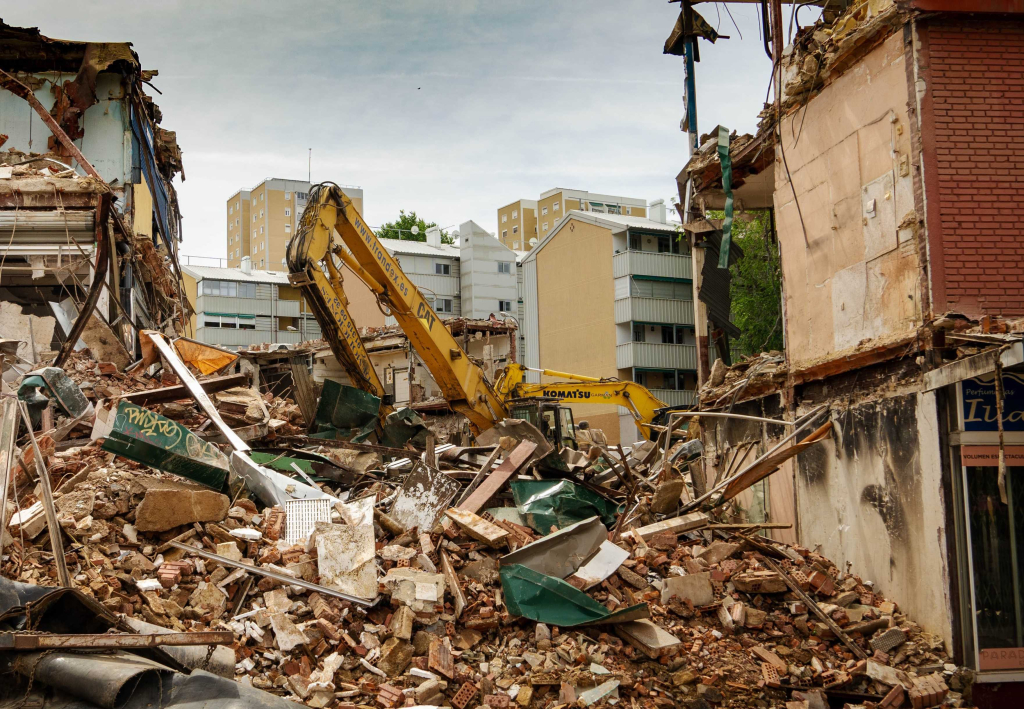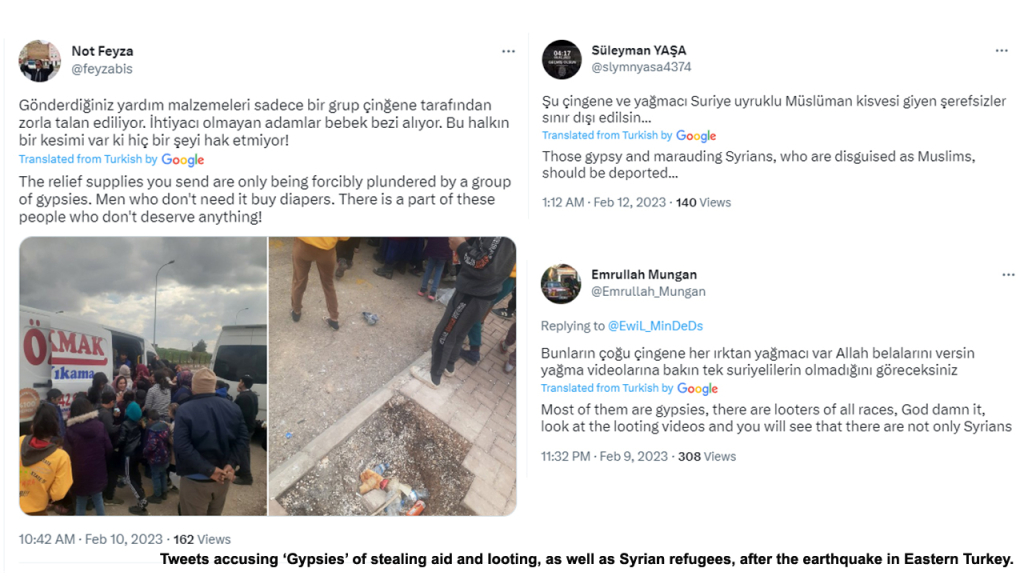Romani, Domari, and Abdal earthquake victims face discrimination and hate crimes in Turkey
06 March 2023

Since the February 6th earthquake in Eastern Turkey, emergency aid efforts in the affected regions have largely missed out marginalised Romani, Domari, and Abdal communities (commonly referred to as Gypsies). These groups often lived in the poorest housing and consequently have been amongst the worst affected, with entire neighbourhoods being destroyed and whole communities made homeless. While geography and racialised poverty have a part to play in this (with many communities being difficult to reach for aid efforts), these groups also must contend with outright discrimination from the authorities, from volunteers, and from members of the public.
At the same time, cases of racism, discrimination, and hate crimes have exploded against those identified as ‘Gypsies’ in Turkey. Romani activists in the region have documented numerous forced evictions from emergency shelters, denial of access to accommodation, removals of families from houses of mourning, and denial of food and water to families who volunteers referred to as “dirty gypsies”.
Selective aid efforts leave out Roma, Dom, and Abdals
The ERRC’s partner organisation, Romani Godi, has confirmed cases of aid supplies being purposely cut to areas with known populations of Roma, Dom, and Abdals. Despite assurances from the Turkish government and local authorities that everyone is being helped equally, many of these communities are on the verge of starvation without access to basic aid. Mahmut Karalar, a local politician from the Abdal community in Gaziantep, described the situation of his people in his city to local news: “People are starving here. There is no bread, no water, no tents. Our people are miserable. There is no place to sleep here. Our minister says that everyone is being helped, but the people here have not received any help."
Göktan Yıldırım is an activist from the Romani Memory Study Association who has been working in the affected region since the first days after the earthquake. He has been working to provide food and essentials to communities otherwise left out of humanitarian efforts. He described the scale of destruction in Domari and Abdal communities, as well as the discrimination they have faced since the earthquake:
"The cities affected by the earthquake were the places where the most concentrated populations of Dom and Abdals lived. Almost all their neighbourhoods were destroyed. In the first few days, the inequality was not visible. Dom and Abdals were also voicing the problems that everyone shared: aid did not come, the state did not come…After three days, when Domari people began to see public officials, the public officials did not see them. We heard from almost everyone that aid was not given, that they were removed from the Red Crescent tents, from the stands opened by the municipality, where they were accused of being looters."
The far-right take advantage of the earthquake to attack minority groups
While structural racism against earthquake survivors continues, far-right groups have capitalised on hardship and fears in the aftermath of the quake to incite violence against Romani, Domari, and Abdal communities (as well as Syrian refugees).

There have been numerous attacks recorded throughout the country against these groups by Romani Godi activists, often directly incited by the far-right who also have publicly accused Roma, Dom, and Abdals of looting. One of the more vocal voices of the far-right has been Ümit Özdağ, the leader of Turkey’s extreme nationalist Victory Party. He has used his platform to accuse ethnic minorities in Turkey of taking advantage of the disaster by looting and stealing aid. In this tweet he shared a video which shows Abdals and Syrians collecting humanitarian aid, to which he commented that ethnic Turks are now “second-class people” in Turkey. As well as hate speech, Özdağ has also called for police and soldiers in the region to be given orders to shoot looters (who he generally infers are Roma and Syrians) on sight. Although no such orders are likely to be given, police and municipality workers in the region have needed little encouragement to either abuse Romani, Domari, and Abdal survivors of the earthquake, or turn a blind eye to hate crimes committed against them.
Discrimination from police, municipality workers, and volunteer workers
The District President of Hatay Dörtyol, Veysel Demir, who is Abdal himself described how the police denied his community access to aid, racially abused his family, and attacked them with pepper spray:
"Aid is distributed here through the mukhtar [elected head of a neighbourhood] and the district governor's office but there are also citizens who come here to ask for help” said Demir in an interview with local media. “People from my family went and asked for help. All they wanted was water. We were discriminated against by the security at the door and the police. They did not give us water, and when the police officers said to us ‘you are cannibals’ and ‘you are thieves’, a quarrel broke out...They treated us as if we were criminals and fired shots in the air and sprayed pepper spray at us…Don't we even have the right to ask for 3-5 bottles of water? Do we have to be under the rubble for them to help us? They don't even see us as earthquake victims.""
Demir filed a criminal complaint for discrimination but admits he does not expect much to come of it. Elsewhere, Romani Godi activists have documented numerous violent hate crimes against Roma, Dom, and Abdals to which the authorities seemingly turn a blind eye. In Adıyaman, a Domari woman, whose house was destroyed and who lost relatives in the earthquake, said to Turkish media: "Everyone looks at us differently…Someone swore at me when I went to buy firewood. He even tried to beat me. He swore at me behind my back, calling me a son of a bitch. He even came to beat me. They do these things every time we go to get water and food.”
Göktan Yıldırım shared similar stories from the region of Domari people being routinely subjected to hate speech and discriminatory treatment by the public as well as volunteer aid workers: "The Dom who asked for a tent in Gaziantep were chased away. In Urfa they were sent back saying 'you are thieves'. When it is realised that they are Gypsies, they are immediately expelled. They can access tents and food in some parts of Antep, but in other parts they can access food only through solidarity [NGOs]. For example, when they went to an aid centre in Adıyaman, both the other earthquake victims and aid distributors kicked them out because they said, 'Gypsies are raiding the place, we cannot eat because they are eating here'.
Communities in need of Human rights and humanitarian aid
The scale of the disaster for Romani, Domari, and Abdal communities in the region cannot be overstated. Whilst solidarity work from activists and local NGOs provides a minimum of aid for these communities, it cannot be sustained for a long period of time and the situation is improving little for these communities who have lost everything in the earthquake. Human rights monitoring and action is necessary alongside humanitarian aid to ensure equal treatment for Romani, Domari, and Abdal people in the region. Without it many more people will suffer in the coming weeks and months as they try to piece their lives back together.
This information was collected from activists working with the ERRC and its partners in the field in Eastern Turkey. If you want to donate to support affected Roma, Dom, and Abdals in the region, as well as support their fundamental human rights, you can do so here.




